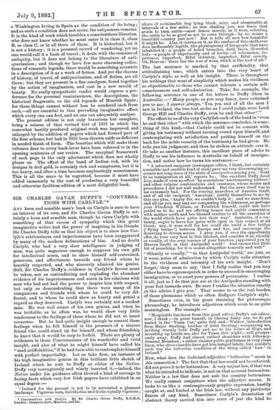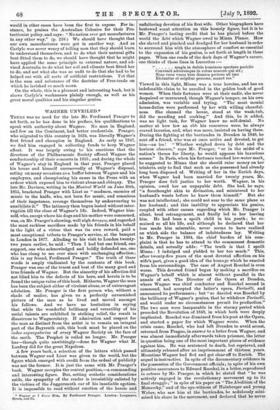SIR CHARLES GAVAN DUFFY'S "CONVERSA- TIONS WITH CARLYLE."*
ANY keen and sensible man's book on Carlyle is sure to have an interest of its own, and Sir Charles Gavan Duffy is cer- tainly a keen and sensible man, though he views Carlyle with something of that excess of sympathy which this great imaginative writer had the power of inspiring in his friends. Sir Charles Duffy tells us that his object is to show how Car- lyle's arbitrariness and imperiousness have been exaggerated by many of the modern delineations of him. And no doubt Carlyle, who had a very clear intelligence in judging of men, was quite sagacious enough to suppress his own gift for intellectual scorn, and to show himself self-restrained, generous, and affectionate towards any friend whom he heartily respected, and who sincerely admired his genius. Still, Sir Charles Duffy's evidence in Carlyle's favour must be taken, not as contradicting and exploding the abundant evidence of his imperiousness and scorn in his relations with men who had not had the power to inspire him with respect, but only as demonstrating that there were many of his companions and friends with whom he could be very dif- ferent, and to whom he could show as hearty and genial a regard as they deserved. Carlyle was certainly not a modest man. He was well aware of his own genius, and when he was irritable, as he often was, he would show very little tenderness to the feelings of those whom he did not at heart reverence. But he had quite insight enough to control these feelings when he felt himself in the presence of a sincere friend who could stand up for himself, and whose friendship he knew that it would be easy to forfeit. There are plenty of evidences in these Conversations of his wonderful and vivid insight, and also of what he might himself have called his "mad artificialities," if he had been able to contemplate himself with perfect impartiality. Let us take first, an instance of his high imaginative genius in this brilliant little sketch of Ireland which he sent to Duffy as editor of the Nation. Duffy very courageously and wisely inserted it,—indeed, the Nation under his guidance often showed a kind of courage in facing facts which very few Irish papers have exhibited in an equal degree :—
" Ireland for the present is not to be accounted a pleasant landscape. Vigorous corn, but thistles and docks equally vigorous;
• Conversations with Carlyle. By Sir Charles Govan Duffy, K.O.M.G. London : Sampson Low, Marston, and Co. ulcers of reclaimable bog lying black, miry, and abominable at intervals of a few miles ; no tree shading you, nor fence that avails to turn cattle—most fences merely, as it were, soliciting the cattle to be so good as not to come through—by no means a beautiful country just now ! But it tells all men how beautiful it might be. Alas, it carries on it, as the surface of this earth ever does ineffaceably legible, the physiognomy of the people that have- inhabited it : a people of holed breeches, dirty faces, ill-roofed huts—a people of impetuosity and of levity—of vehemence, im- patience, imperfect, fitful industry, imperfect, fitful veracity. Oh, Heaven ! there lies the woe of woes, which is the root of all."
The last sentence is marked by that artificiality, that attitudinising tone, which enters into the very heart of Carlyle's style, as well as his insight. There is throughout his writings that want of simplicity which makes his vividness so objectionable to those who cannot tolerate a certain self- consciousness and self-admiration. Take, for example, the following sentence in one of his letters to Duffy (then in Australia) :—" Many people, as you may fancy, have criticised you to me ; I answer always, Yes, yes, and of all the men I saw in Ireland, the two best, so far as I could judge, were Lord George Hill and Charles Duffy, even he and that other !"
The effect to us of the very Carlylish cock of the head in "even he and that other" with which the sentence concludes, is some- thing of this kind,—that Carlyle could not be content with giving his testimony without turning round upon himself, and contemplating with satisfaction and patting himself on the back for the noble veracity of the testimony he had given. He tells you his judgment, and then he strikes an attitude over it. Or take as another instance, this excellent piece of advice to Daffy to use his influence in Australia on behalf of immigra- tion, and notice how he turns his sentences :—
"A returned emigrant (newspaper editor, I think, but certainly a sensible and credible kind of man) gave me very discouraging ac- counts not long since of the state of immigration among you. Next to no immigration at all,' reports he ; the excellent Duffy Lan& Law, made of even no effect' by scandalous auctioneering jobbers and other vulpine combinations and creatures, whose modes and procedures I did not well understand. But the news itself was to me extremely bad. For the roaring anarchies of America itself, and of all our incipient Americas,' justify themselves to me by this one plea, Angry Sir, we couldn't help it : and we anarchies, and all (as you may see) are conquering the wilderness, as perhaps your Friedrich William, or Friedrich himself, could not have guided us to do, and are offering homes and arable communion with mother earth and her blessed verities to all the anarchies of the world which have quite lost their way.' Australia, of a cer- tainty, ought to leave her gates wide open in this respect at all times ; nay, it were well for her could she build a free bridge (` flying bridge') between Europe and her, and encourage the deserving to stream across. I pray you, if ever the opportunity offer, do your very best in this interest, and consider it as, silently or vocally, of the very essence of your function (appointed you by Heaven itself) in that Antipodal world ! And excuse this little bit of preaching, for it is meant altogether honestly and well."
"Silently or vocally," "in that Antipodal world," are just, as it were, notes of admiration by which Carlyle calls attention to the vividness and intensity of his own insight. Don't forget,' they seem to say, 'that I fully realise that you may either have to repress speech in order to succeed in encouraging immigration, or to exert your powers of persuasion. I realise it all, just as I do that you are at the Antipodes standing with your feet towards ours. Be sure I realise the situation exactly in the advice I give you.' That seems to us the real burden of these pleonasms which so often disfigure Carlyle's style.
Sometimes even, in his great straining for picturesque phraseology, he introduces adjectives which seem to us quite meaningless. For example :—
"Hospitable luncheon from this good editor, Duffy's sub-editor, now, I think ;—in great tumult, in blazing dusty sun, we do get seated in the Tuam Car,' quite full and—Walker [introduction from Major Sterling, brother of John Sterling] recognising me, inviting warmly both Duffy and me to his house at Sligo, and mounting up beside me, also for Tuam this night,—roll prosper- ously away, Duffy had almost rubbed shoulders with Attorney- General Monahan ; a rather sinister polite gentleman in very clean linen, who strove hard to have got him hanged lately, but couldn't, such was the bottomless condition of the thing called 'Law' in Ireland."
Now, what does the italicised adjective "bottomless" mean in this connection P The fact that that law could not be enforced, did not prove it to be bottomless. A very unjust law, if that was what he intended to indicate, is not on that account bottomless. Neither is a law that does not suit the country bottomless. We really cannot conjecture what the adjective means. It looks to us like a contemptuously graphic expression, hastily caught at, and burled at the Irish law, without any particular fitness of any kind. Sometimes Carlyle's detestation of abstract theory carried him into error of just the kind he
would in other cases have been the first to expose. For in- stance, he praises the Australian Colonies for their Pro- tectionist policy, and says : "No nation ever got manufactures in any other way." (p. 218.) We should have thought that our own manufactures were got in another way. And as Carlyle was never weary of telling men that they should learn to understand themselves, and to do what their natural gifts best fitted them to do, we should have thought that he might have applied the same principle to external nature, and ad- vised Australia to do what her soil and climate best fitted her to do, and not what she was so unfit to do that she had to be helped out with all sorts of artificial restrictions. Yet that is the sum and substance of the doctrine of Free-trade on which he lavished so much scorn.
On the whole, this is a pleasant and interesting book, but it shows Carlyle's weaknesses plainly enough, as well as his great moral qualities and his singular genius.



















































 Previous page
Previous page